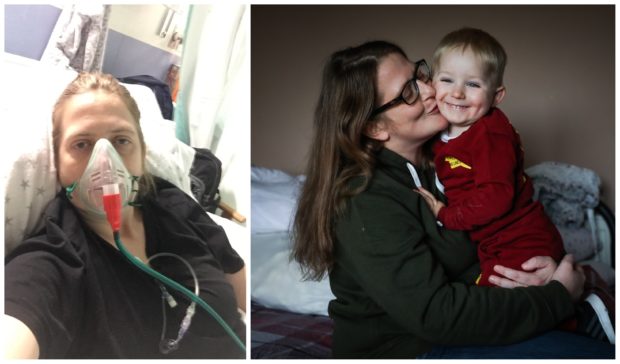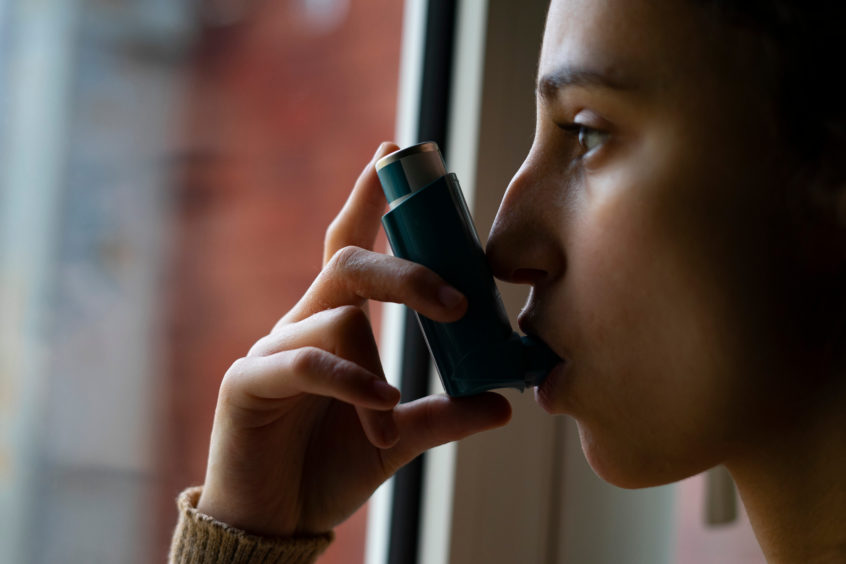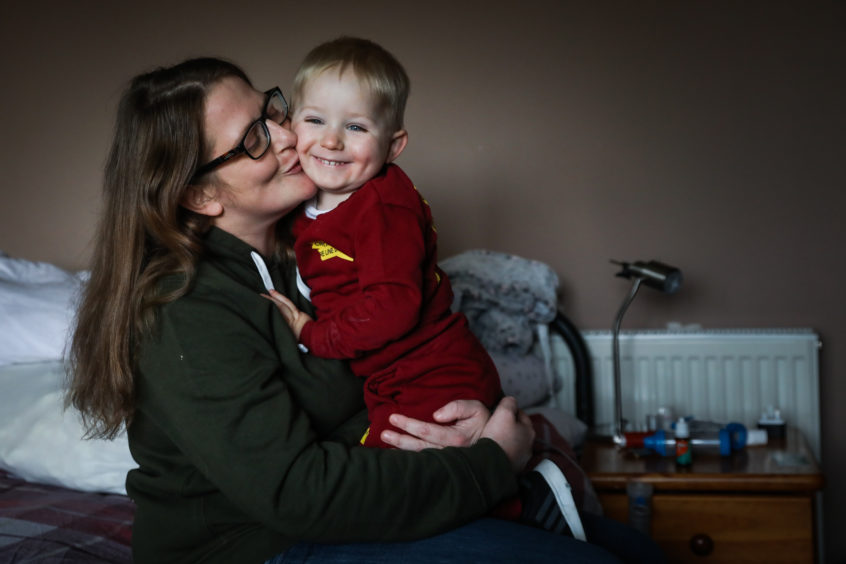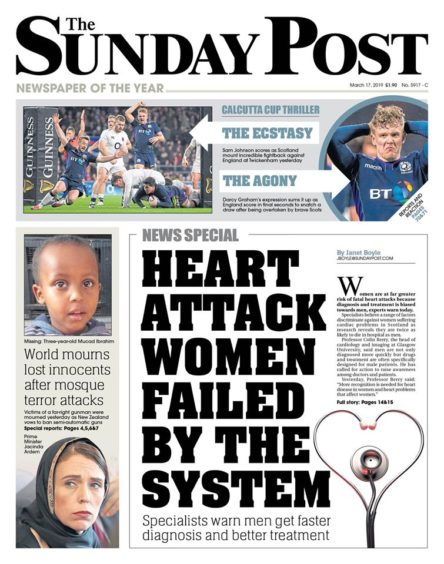
Twice as many women as men are dying from asthma in Scotland, we can reveal, prompting experts to call for more research to cut the death toll.
While the number of male sufferers admitted to hospital is falling, the number of women is twice as high and rising, according to analysis of admission figures.
Now experts, campaigners and patients are calling for more research to discover why woman seem to suffer more and to help develop better treatment.
The latest Scottish Government figures show asthma claimed the lives of 80 women and 34 men in 2018. Over the five years to 2018, 404 women and 163 men died. The number of men admitted to hospital fell to 43.8 per 100,000 of the population but for women that figure rose to 71.9.
Also, the number of emergency admissions for men over the three years to 2018 fell steadily, while for women it rose to almost double the male figure.
Around 363,000 people in Scotland have asthma, one of the highest rates in the world. It is more common in young boys than girls, but older women are more susceptible than older men.
Doctors know that asthma can be affected by hormones, but obesity is also a factor and it can also be related to environmental factors such as pollution.
Dr Joe Zein, one of the world’s leading experts on the impact of gender on asthma, said more research is needed in order to develop better treatment for women.
The Ohio-based medic said: “Current asthma therapy does not take into account the most important factor causing severe asthma, ie gender.
“Additional work is needed to establish the mechanisms through which gender and hormones influence asthma across the life span.”

The UK-wide National Review of Asthma Deaths of 2012/13 found that two thirds of deaths were preventable with good, basic care. Dr Rob Niven, one of the UK’s leading experts on specialist asthma care, said research needs to be done to establish why women are more likely to suffer the severe form of the disease and he called for better treatment programmes.
He said: “The key issue is that severe asthma is more common in women, with a 65:35, female to male, split.
“The mechanism is completely unknown, though it is established that asthma is more common in boys in early life until they are teenagers, then boys can grow out of it, whilst girls don’t seem to. I do think there needs to be more research as to why that is.”
Research has linked asthma rates to hormonal changes which men and women experience during their lifetimes. Dr Niven said: “But has anybody actually come up with an adequate explanation for that? The answer is no.”
Dr Niven, a senior lecturer in respiratory medicine at University Hospital of South Manchester NHS Foundation Trust, called for the NHS to follow the lead of Scandinavian countries, where preventative rather than reactive treatments have reduced the death rate from asthma almost to zero. He said: “We want to concentrate on doing what really is going to matter, which is stopping people avoidably dying of a disease which is manageable.
“The biggest concern is an over-reliance on a reliever inhaler. We know that promotes worsening asthma.
“You should be using a preventative strategy with an inhaled steroid.
“Optimum treatment is considered where you only need a reliever inhaler once every two weeks or less. That is very much not being achieved in the UK.”
Professor Martyn Partridge, Emeritus Professor of Respiratory Medicine at the National Heart and Lung Institute, Imperial College London, said more research was needed into why males and females are more susceptible – and more severely affected by – asthma at different times of their lives.
He said: “These gender differences should act as stimulus for more research, and patients and health professionals should be alert to the greater prevalence of asthma in older females.”
Joe Farrington-Douglas, Head of Policy and External Affairs at Asthma UK, said: “Compared to men, women with asthma can have worse symptoms more often, and they are more at risk of potentially life-threatening asthma attacks.
“There are many reasons why more women are admitted to hospital than men. However, research shows there is a link between hormone changes and asthma which can affect women. For women who already have asthma their condition often gets worse during and around menopause.
“With statistics in Scotland showing there were more female emergency admissions in 2017/18 than the previous year, it’s vital everyone receives basic asthma care as it can save lives.”
Dami Jaiyesimi, Health Promotion Manager at the Asthma and Allergy Foundation, said: “We continue to urge the Scottish Government to embrace asthma educational initiatives and programmes, increase access to asthma education across various community groups and facilitate the administration of such programmes to help improve long-term outcomes for people living with asthma in Scotland”.
Labour MSP Elaine Smith is retiring from Holyrood next year due to asthma and thyroid issues.
Ms Smith, 56, who has been an MSP since 1999, said: “After hearing these figures, I will be saying to the Scottish Government they need to find out why this is happening and I will ask if we need targeted interventions for women, which presumably we do.”
The Scottish Government said: “We have co-funded work with Asthma UK as part of a joint call to explore innovative applications of digital and technology in asthma treatment. We have also invested £3.8 million in research.
“However, we know more can be done, which is why we are currently seeking views on our new Respiratory Care Action Plan for Scotland.
“This consultation sets out key priorities in the prevention, diagnosis and treatment of respiratory conditions. It also affords the opportunity to seek views on any concerns there may be around a possible imbalance in the number of women and men affected.”
Diane’s story
Diane Robb, 36, was rushed to hospital in an ambulance shortly before Christmas, struggling to breathe.
She is one of the growing number of women admitted to hospital as emergencies because they are suffering life or death asthma attacks.
The mum of two from Arbroath has chronic brittle asthma.
Despite doing everything in her power to keep breathing well she will be rushed into hospital every few months when asthma strikes.
“I work hard to stay healthy because I want to see my son and daughter grow up,” she says.
“When asthma strikes you literally feel as though you are breathing your last. Sadly, many women, particularly mums, put themselves last when caring for their health.
“I know women who don’t take their inhalers as regularly as they should, and say they will do it after they see the children out to school, make the dinner or do the many other daily chores. I have done this myself in the past and it’s perfectly understandable when you are a mum, programmed to run after your children. It’s my goal to go a year without being admitted to hospital in an emergency.”
Diane was diagnosed at four and by eight was already in hospital.
It worsened as a teenager but says that when she suggested that her asthma could be hormone-driven, she was talked down by her specialist.
She adds that during both pregnancies she remained asthma-free.
“Today thankfully, I have a good respiratory consultant who acknowledges that hormones trigger asthma in women.
“But we desperately need research for drugs which will combat it.
“I have tried several treatments but none has worked. Women suffer more but it is important to keep the nation’s mums alive.
“Some women are going without automatic call-ups from the GPs for their annual assessments.
“If women are more at risk then more attention needs to be paid to keep us alive.
“My hospital and GP are excellent but I have heard from other women who are not that lucky.
“Above all, I urge other women not to miss an inhaler or asthma drug because you think you can go without.
“Long-term neglect does silent damage your lungs.”
At her fittest Diane managed to climb Ben Nevis with friends and swims regularly because doctors have told her to exercise when she can.
“Then weeks later without warning I plunge into a life-threatening asthma attack,” she added.
Lydia’s story
Linda MacDonald and her husband Ron lost their daughter Lydia to asthma.
The young mum passed away suddenly, aged 28, with an asthma attack.
Linda and Ron stepped in to raise Lydia’s little boy, Mason, and now campaign for asthma awareness.
Speaking from her home near Scone, Perthshire, Linda said: “Many people, even folk with asthma, do not know that you can die from asthma.
“It is worrying that women are so much more likely to be admitted to hospital or die from it.
“Lyda had to give up her career as a hair stylist because working with dyes and hairspray made her asthma so much worse.”
“If women are more susceptible we need targeted research which improves this. It’s not something we should just accept.
“Women’s lives are busy with family and often work so it’s not difficult to see why many women can forget or delay taking their inhalers or drugs.
“We need to discover why women are more affected and find ways of treating this.
“The government needs to drive this and soon.”
“We do everything to keep Lydia’s memory alive for Mason.
“We talk about her every day and do everything to make Mason’s life happy.
“Lydia had her life in front of her and she was popular at an adult care centre where she worked.
“They would draw lovely pictures for her and some even attended her funeral.
Jean’s story
Jean Birrell, 51, from Glasgow has been admitted to hospital several times through asthma.
The mum-of-nine says she had to give up her office job partly because of her breathing attacks.
“I firmly believe that women struggle with taking their asthma treatment,” she said.
“My advice would be to delegate as much as you can to your family. I would like more research to be carried out on the triggers for asthma and preventing them from impacting on lungs.
“Something as simple as damp caused by a leak under the kitchen sink can be a trigger. It was enough to trigger a serious asthma attack and make me seriously ill.”
Gender bias in health is still here say campaigners
Women are being failed by medical science and health services, campaigners fear.
For many conditions, the drugs, treatments, medical devices and techniques have been developed for use on men, rather than women and the often-unnoticed bias towards men can have lethal consequences for women.
Health is one area examined by author Caroline Criado Perez in her book Invisible Women: Exposing Data Bias In A World Designed For Men.
She said: “For millennia, medicine has functioned on the assumption that male bodies can represent humanity as a whole.
“As a result, we have a huge historical data gap when it comes to female bodies. Women are dying, and the medical world is complicit. It needs to wake up.”
The Sunday Post has led the way in reporting how women can be disadvantaged in health diagnosis and treatment.
Last year, we told how Scottish women are twice as likely to die in hospital from a heart attack as men – despite suffering fewer heart attacks.
Heart problems are mostly thought to be a risk to men, so women who suffer a heart attack are less likely to be properly diagnosed and the drug treatments they receive will have been designed for male, rather than female, patients.
Only men are routinely scanned for a major artery defect – a abdominal aortic aneurysm – even though a third of those who die from it are women.
Meanwhile, the mesh implant scandal saw the use of poorly-tested polypropylene plastic mesh kits on thousands of women – to save £200 per patient. The worldwide scandal has seen manufacturers paying hundreds of millions of pounds in compensation to oversees victims.

Enjoy the convenience of having The Sunday Post delivered as a digital ePaper straight to your smartphone, tablet or computer.
Subscribe for only £5.49 a month and enjoy all the benefits of the printed paper as a digital replica.
Subscribe © Mhairi Edwards/DCT Media
© Mhairi Edwards/DCT Media
 © Mhairi Edwards/DCT Media
© Mhairi Edwards/DCT Media
